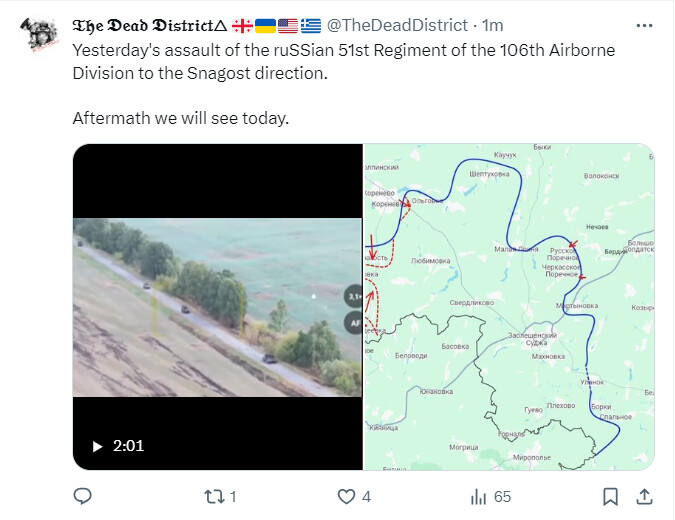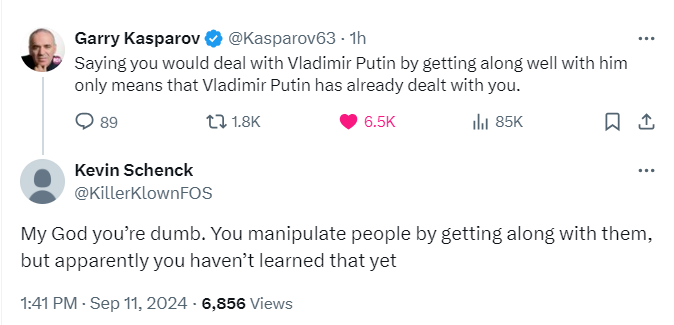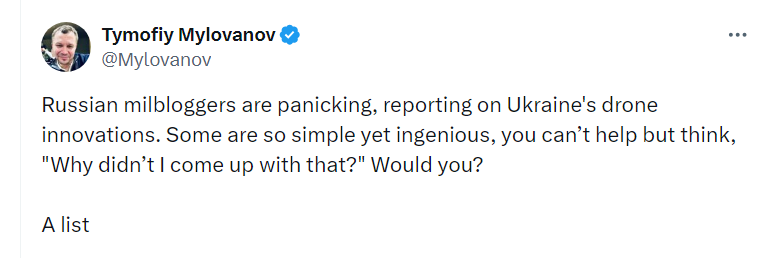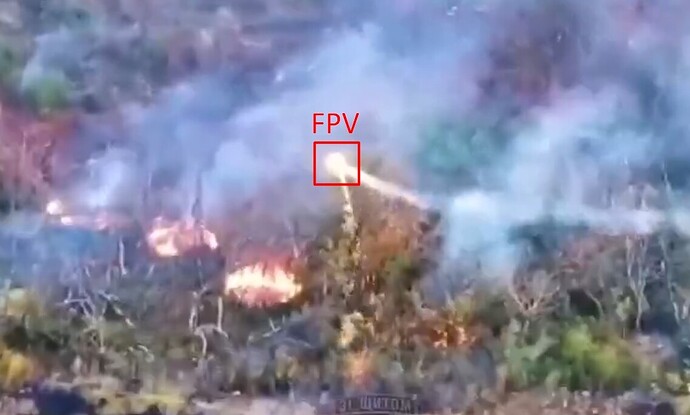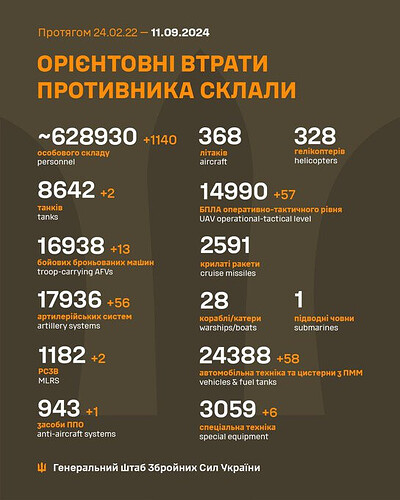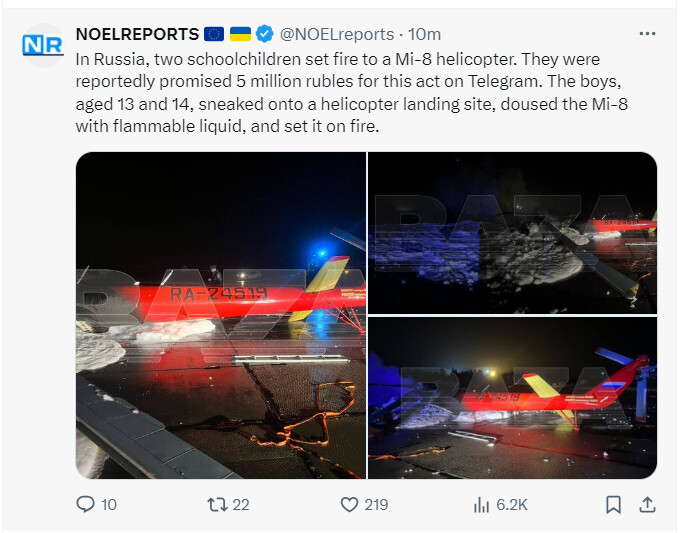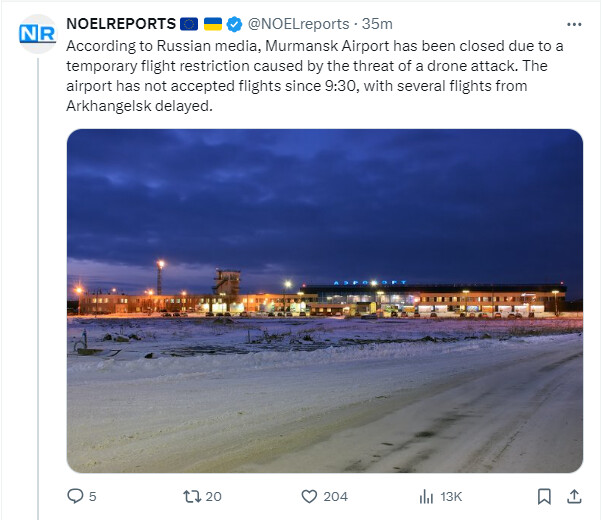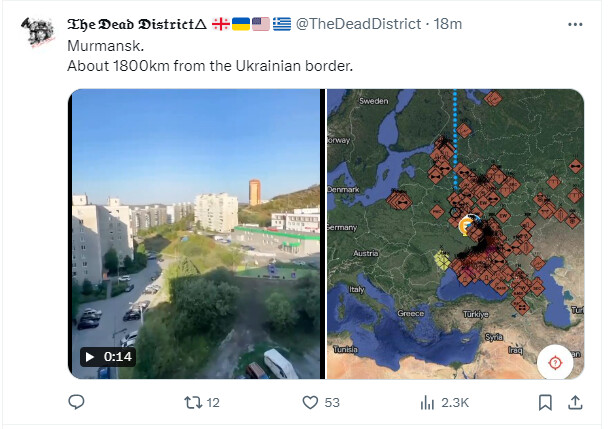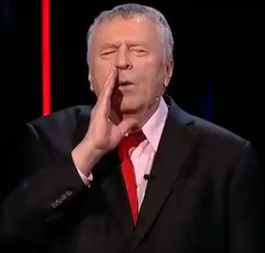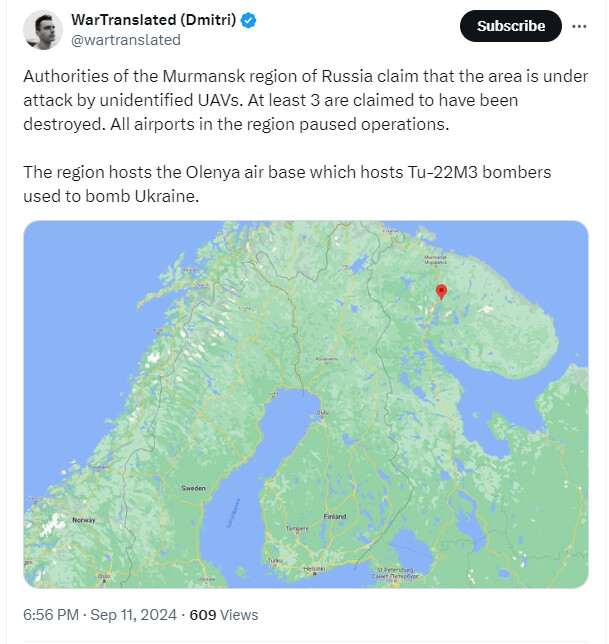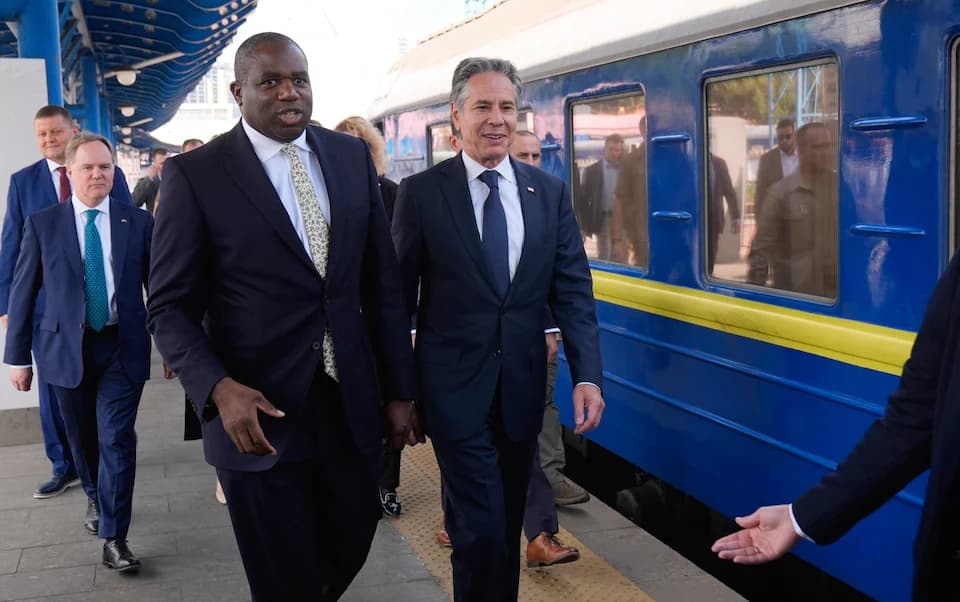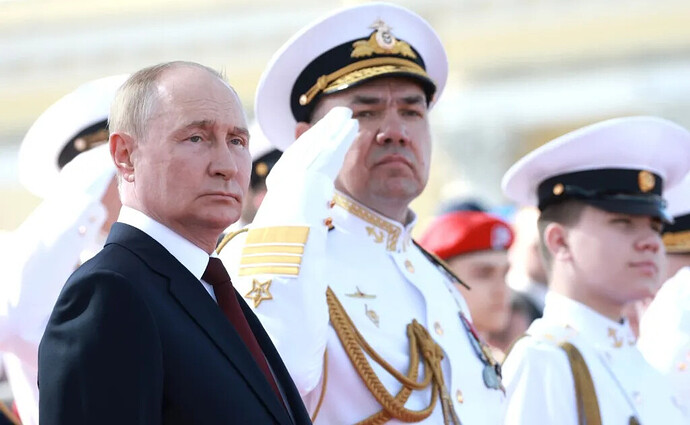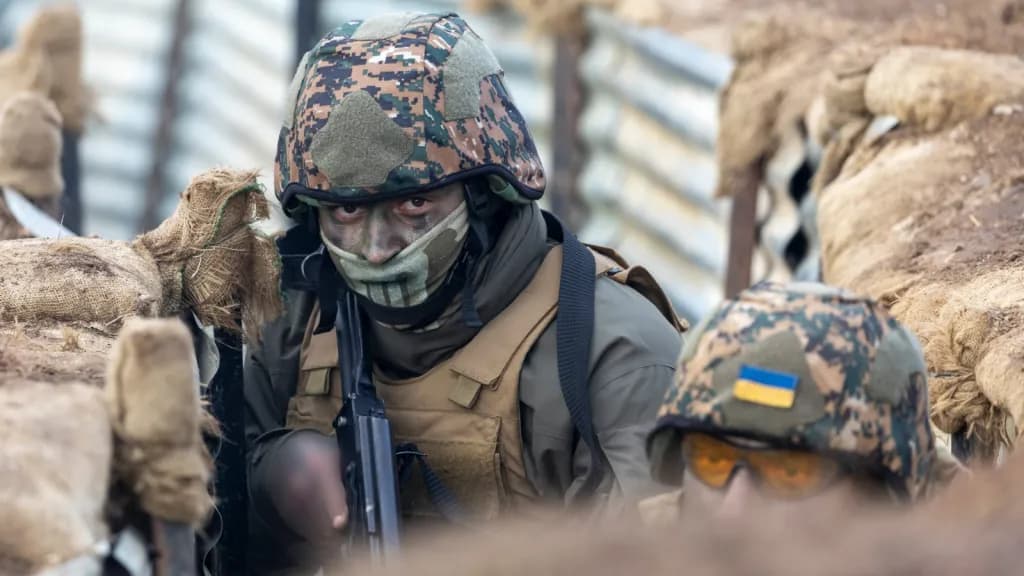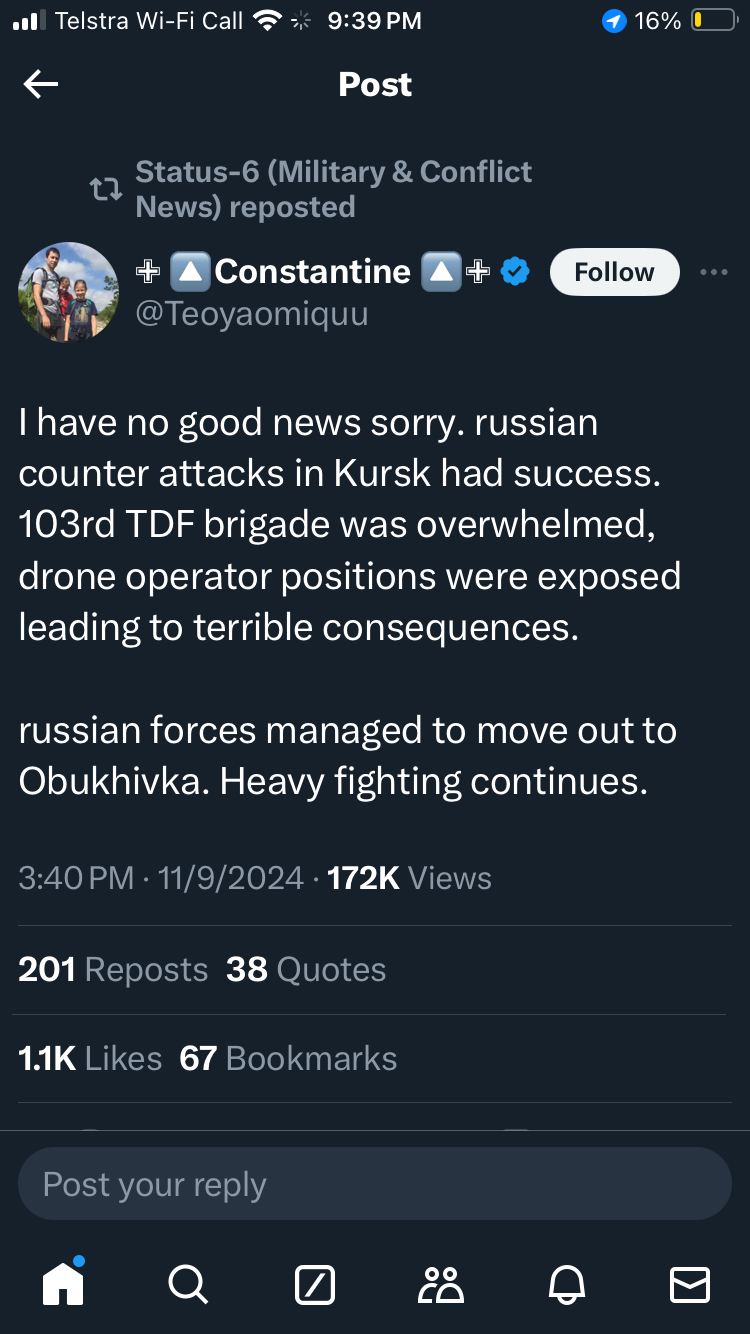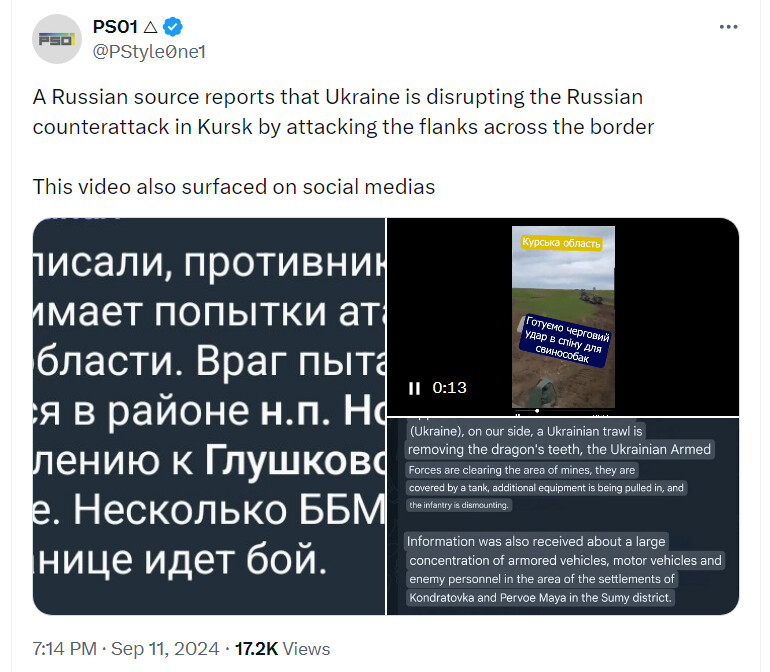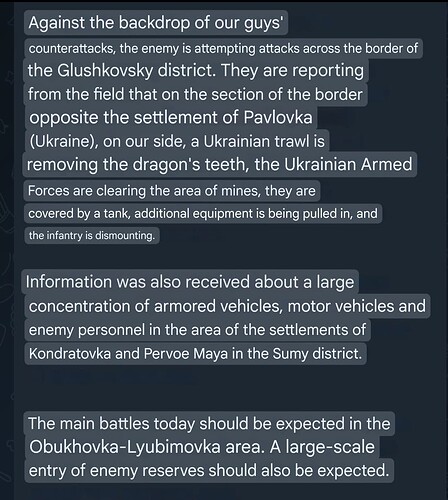I’m sure he’s got “concepts of a plan” ![]()
Watching Trump was bad enough, l couldn’t sit still and watch the RU propaganda mouth pieces as well. You are more steadfast than l.
I agree that it would have been quicker. this decision comes as we predicted, as a direct result of Iran sending their latest batch of missiles. At least now UA can strike back, almost anywhere they know is a decent target. Slava Ukraina!
1/ Fast FPV drones paired with slow bombers to protect them from Russian air defense
“The enemy [Ukraine] has begun pairing their slow agricultural drones, known as ‘Baba-Yaga,’ with [fast] FPV drones equipped with night cameras and thermal imagers. This tactic counters the anti-drone defenses set up by our [Russian] units, 2/
where machine gunners using thermal imagers play a crucial role. Now, when a team fires at the night bomber—‘Baba-Yaga,’ capable of carrying up to 40 kg of munitions—they are immediately targeted by FPV drones.”
2/ Dusk drone mining
“The enemy is also actively using drones to mine roads behind our positions. ‘Yagas’ drop standard mines at dusk, relying on drivers not noticing and running over them.”
3/ FPV traps
“Ukrainian FPV drones are also used more cunningly: they land near a road and wait for a target. Once a vehicle or group of people enters their field of view, the drone takes off and strikes from ambush”
4/ FPV drones as air defense
“Recently, the enemy has gone even further: modified FPV drones are now being deployed to hunt down our reconnaissance UAVs.
Ukrainian FPV drones have been spotted at altitudes above 1,200 meters, functioning as a constant air defense system. When Russian reconnaissance UAVs enter their range, they are swiftly shot down.”
There were also reports of Ukrainian drones attacking Russian helicopters in flight.
The effect of these techniques, low cost and asymmetric, is that Russia loses reconnaissance capabilities, making striking capabilities irrelevant.
That’s smart. Instead of defending against Russian attacks, make them imprecise and ineffective
Source: Kasyanov on FB, Russian channel “Tsargrad” X
Russian losses per 11/09/24 reported by the Ukrainian general staff
+1140 men
+2 tanks
+13 AFVs
+56 artillery pieces
+2 MLRS
+1 AD system
+57 UAVs
France, UK and Germany have issued a joint statement announcing the immediate cancellation of bilateral air services with Iran , more sanctions to follow.
For some people, it’s greed and profiting off others before everything else, including your own nations survival. That doesn’t just apply to Ukraine. World-wide, a certain type of person’s avarice knows no ethical bounds.
Opinion: State predation threatens to derail Ukraine’s war effort
September 11, 2024 10:20 AM
5 min read
Russia’s full-scale invasion of Ukraine in February 2022 has led to a resurgence in state predation against businesses, now approaching pre-EuroMaidan levels. This issue cannot be postponed until after the war. Politicized, predatory actions by law enforcement agencies against both domestic and foreign businesses pose a significant threat to Ukraine’s national security.
State predation is not new in Ukraine. Investigations targeting legitimate businesses – aimed at either extorting money or taking over companies at a fraction of their value – have been a feature of Ukrainian business life since independence. However, large-scale predatory activities by so-called law enforcement agencies were curbed after the Revolution of Dignity.
New reforms post-2014, including transparency rules requiring asset declarations, digitalization reducing rent-seeking, banking sector reforms, and the creation of the Prozorro online tendering platform, made life more difficult for predators. These reforms, coupled with stronger anti-corruption institutions, signaled to officials to leave legitimate businesses alone. The media and the parliament also became more vigilant about such behavior.
However, Russia’s full-scale invasion undermined much of this progress. While the influence of industrial oligarchs has diminished due to the war, and wartime anti-corruption successes have been recorded, the centralization of state power has provided an incentive for predatory law enforcement agencies to return.
By mid-2023, Ukrainian business executives formed Manifesto 42 – named after Article 42 of Ukraine’s constitution, which guarantees the right to conduct business – to protect their interests. As my paper for the Harvard Ukrainian Research Institute highlights, business leaders involved in Manifesto 42 have since been targeted by law enforcement.
By January 2024, Ukrainian Business Ombudsman Roman Waschuk lamented that “it is disturbing that we are returning to the practices not of 2015 but of 2013,” referencing the corporate raiding under former Ukrainian President Viktor Yanukovych.
These predatory practices target both high-tech and low-tech businesses alike, and foreign investors are not spared. Swedish pharmaceutical company Synevo, as well as Ferrexpo, which is listed on the London Stock Exchange, have also been subject to raids.
The issue of raiding gained public attention in January when Ihor Mazepa, a leading member of Manifesto 42, was arrested at the Ukrainian-Polish border. This led to an emergency meeting between business leaders and Ukrainian President Volodymyr Zelensky. While some steps were taken, including a temporary halt to certain raids and the creation of a business council, substantial change to stop state raiding remains elusive.
There are four key reasons why state predation is a national security threat.
First, approximately half of Ukraine’s budget is funded by Western allies and international institutions; the rest comes from domestic resources. The government must foster economic growth and increase tax revenues to fund the war. Predation on legitimate businesses by law enforcement agencies threatens these revenue streams and the state’s ability to wage war.
Second, given that Western allies are funding nearly half the budget, failure to maximize Ukraine’s own budget could jeopardize their support. Western outrage is likely if law enforcement both undermines tax revenues and profits from predatory actions, creating a double scandal in wartime.
Third, large-scale predation by Ukrainian law enforcement is a gift to Russian propagandists. Moscow could easily exploit and distort these actions to undermine Western support for Ukraine.
And fourth, if state predators are not stopped, no foreign or domestic investors will risk capital in Ukraine post-war. When peace is achieved, businesses will be quick to exit if predation continues. Additionally, Ukraine’s failure to address these rule-of-law issues during wartime raises concerns about its ability to meet EU accession standards.
It was a positive step that Ukraine’s parliament adopted reforms to the Economic Security Bureau (ESB) over the summer. However, predatory activities by law enforcement agencies continue to pose a significant threat to Ukraine’s legitimate businesses. The ESB reforms must be quickly implemented, and additional measures taken to stop predatory actions.
Appointing a new head of the ESB would help build confidence. The appointment should be made rapidly by an independent commission that includes international representatives. The ESB was originally intended to take over all economic crime investigations, and this goal should be pursued immediately. Otherwise, a jumble of law enforcement agencies will still prey on businesses, even if the ESB itself is reformed and operates independently.
Another factor, noted in my HURI paper, is that older cases often give predatory officials their greatest leverage. One option for the ESB is to take over all cases more than five years old, assess them, and close those that lack evidence, prosecuting only those that warrant it.
There is also a case for establishing a G7-led team consisting of representatives from the G7, the European Union, and Ukrainian civil society to bolster Ukraine’s anti-corruption and rule-of-law efforts. This team could gather evidence in Ukraine, liaise with law enforcement agencies in allied countries to freeze assets of corrupt officials, and take steps to seize those assets and begin prosecutions. A dual law enforcement approach, inside and outside Ukraine, would create significant risk for those seeking to loot businesses and undermine the war effort.
David Lammy and Antony Blinken arrive in Ukraine
Updated 8 minutes ago
David Lammy and Antony Blinken have arrived in Kyiv, as they prepare to meet with senior Ukrainian officials at what they described as a “critical moment” in its war with Russia.
Mr Lammy, the Foreign Secretary, and Mr Blinken, the US secretary of state, will meet with Volodymyr Zelensky to discuss what Kyiv needs to achieve its goals against Russia.
“I think it’s a critical moment for Ukraine in the midst of what is an intense fall fighting season with Russia continuing to escalate its aggression,” Mr Blinken said in London at a news conference alongside Mr Lammy on Wednesday.
The Ukrainian president has repeatedly called on Western nations, including the US and the UK, to supply long-range missiles and lift restrictions on them being used on Russian territory.
The Telegraph reported on Tuesday that Joe Biden, the US president, is set to lift a ban on British Storm Shadow missiles being used into Russia after Iran delivered a batch of ballistic missiles to Moscow.
Mr Blinken and Mr Lammy’s visit comes at a time when Russian forces are continuing to make significant advances in the east of Ukraine as they march towards Pokrovsk, a key logistics hub in the Donetsk region.
Over 11,700 civilians killed in Ukraine since start of Russian war: UN official
‘We are deeply concerned by the recent expansion of fighting to new areas on both sides of the Ukraine-Russia border,’ says Joyce Msuya
Merve Gül Aydoğan Ağlarcı |11.09.2024 - Update : 11.09.2024
 Fire broke out in a factory after Russian shelling in Konstantinivka
Fire broke out in a factory after Russian shelling in Konstantinivka
HAMILTON, Canada
The UN said Tuesday that more than 11,700 civilians have been killed since the start of Russia’s war in Ukraine in February 2022, urging leaders preparing for the 79th General Assembly session to seize all opportunities to end the conflict.
“Regrettably, two and a half years since the escalation of this war, the situation only continues to worsen. The death toll is mounting. Human suffering continues at intolerable levels,” Acting Under-Secretary-General for Humanitarian Affairs Joyce Msuya said at a UN Security Council session.
The session, which was held at the request of France and Ecuador, addressed Russia’s attacks on civilians and civilian infrastructure in Ukraine.
Msuya emphasized that 10 million people have been forcibly displaced in Ukraine and large-scale attacks have been ongoing across the country since Aug. 26.
“We are deeply concerned by the recent expansion of fighting to new areas on both sides of the Ukraine-Russia border,” she said.
Noting that military operations in Russia’s Kursk region have displaced 130,000 people, Msuya said that civilians and civilian infrastructure have also been targeted in this region.
“I must remind all parties of the obligation to take constant care to spare civilians and civilian objects as international humanitarian law demands,” she said.
Emphasizing that the increase in military activities is hindering humanitarian operations and endangering aid workers, she expressed gratitude for an “almost $1.4 billion” donation for the humanitarian response in Ukraine.
“However, three-quarters of the way through the year, the Humanitarian Needs and Response Plan is still less than half funded. To sustain operations in an increasingly complex and dangerous environment, we urgently need donors to increase and accelerate flexible funding for the response,” she said, adding that 14.6 million people across Ukraine need assistance.
Msuya further called on world leaders preparing for the 79th UN General Assembly session “to seize every opportunity to secure the decisions that will spare civilians and finally bring this war to an end.”
Battle Of Kursk: Why It’s Advantage Russia Despite Ukraine’s Stealthy & Speedy Gains Into Russian Territory?
September 11, 2024
Has Ukraine’s bold offensive on August 6 into Russia’s Kursk region, leveraging surprise and speed to quickly bypass Russian defensive lines, turned out to be a pyrrhic victory? Will the costs incurred in winning the battle in Kursk and their future repercussions diminish or enhance the prospects of Ukraine winning the much bigger war against Russia?
It seems that these questions have become a favorite topic for discussions among strategic elites worldwide. Predictably, answers have differed.
This piece essentially summarizes these varying arguments, leaving the readers to have their own conclusions.
Some, like Orysia Lutsevych, deputy director of the Russia and Eurasia program and head of the Ukraine forum at Chatham House, see the Kursk offensive as a great triumph for Kyiv, which has “humiliated” Russian President Vladimir Putin. Never in recent history has any foreign power militarily transgressed into Russian territory.
After all, more than a month into the attacks, Ukrainian forces are holding Russian territory and continuing offensive operations. They have taken hundreds of Russian soldiers as prisoners and assert to consolidate a defensible buffer inside Russia.
Piotr Śledź of the University of Warsaw argues that the Kursk Offensive is arguably a more psychological operation than purely military. “It is a morale boost that Ukrainian citizens and troops needed after months of Russian onslaught involving hundreds of drones and missiles striking civilian locations and critical infrastructure. That is crucial for its capacity to mobilize manpower, which seems increasingly challenging”.
For defense journalist Stavros Atlamazoglou, territorial gains in Kursk give Kyiv a bargaining chip for seeking Russian withdrawal from internationally recognized Ukrainian territory now.
"By invading Russia, the Ukrainian leadership took a gamble. The ultimate goal wasn’t to capture and annex Russian land. Rather, the objective was to create such a threatening and humiliating situation for the Russian military, forcing the Kremlin to draw troops from the contact line in Ukraine to deal with the threat. (The latest estimates put the number of Russian troops in Ukraine, including the Crimean Peninsula, at between 400,000 and 500,000.) As a result, Ukrainian forces in Ukraine would have an easier time defending. In addition, Kyiv would have some bargaining power in the form of captured Russian land in the event of negotiations”, he points out.
Michael Kofman, a Senior Fellow at the Carnegie Endowment for International Peace, and Rob Lee, a Senior Fellow at the Foreign Policy Research Institute, argue that besides demonstrating Ukraine’s strength and challenging the narrative of Russian invincibility, the success in Kursk could influence the cautious American policymakers on the eve of their presidential elections.
The idea is “unlocking additional material assistance and altering the West’s weapons restrictions.” Ukraine’s leaders judged that the Kursk success would lead to relaxation in American pressure on them to agree to negotiations with Moscow. Thus, the Kursk Offensive will spur a change in the perception of Ukrainian abilities.
Russia’s President Vladimir Putin at the Main Naval Parade held in St Petersburg:
Second School Of Thought
However, there is a different school of thought that says it is a matter of time before Ukraine shifts its troops from Kursk and redeploys them back to Eastern Ukraine, where Russian forces are making steady advances.
According to the latest report from the Economist magazine, Russia, for the past two months, has poured most of those resources into attacking the logistical hub of Pokrovsk, just north-west of Kurakhove. The center of the fighting has moved to the towns of Ukrainsk and Halytsynivka, about 15km north of Kurakhove, both visible from a distance by the plumes of dark smoke.
As one writes this, Russia claims that its armed forces had gained full control of Novohradska. The small town lies less than 9km from Pokrovsk, a strategically important city in eastern Ukraine because of its rail and road links. Russian soldiers have been advancing rapidly from the east as they consolidate control of the Donbas region.
It may be noted that Pokrovsk is a crucial logistical and transportation hub in the Donbas region (Donetsk is its capital city), sitting at the crossroads of major road and rail networks vital for the supply and reinforcement of Ukrainian positions throughout the eastern front.
If Russian forces capture Pokrovsk, they would effectively cut off these critical supply lines, isolating Ukrainian units defending other key areas in Donetsk.
According to Andrew Latham, a senior fellow at the Institute for Peace and Diplomacy and a non-resident fellow at Defense Priorities in Washington, D.C., the loss of Pokrovsk could have a cascading effect, leading to a broader collapse of Ukrainian defenses in the Donetsk region.
Ukrainian troops being trained in the UK under ‘Operation Interflex’ -UK MoD
Ukrainian troops in these areas rely heavily on the supply routes passing through Pokrovsk for ammunition, reinforcements, and logistical support. Any disruption to these supply lines could severely compromise their ability to hold their ground against Russian advances, potentially allowing Russia to make further gains in eastern Ukraine and altering the course of the conflict.
From a military perspective, Latham argues that the incursion into Kursk has not yielded any significant gains for Ukraine. Rather than forcing Russia to divert substantial forces away from its main effort in Donetsk, it has resulted in the diversion of some of Ukraine’s best troops and advanced equipment away from the most strategically critical frontlines.
This shift has not only weakened Ukraine’s defensive posture in the Donetsk region but has also exacerbated existing manpower shortages, compounding the challenges Ukrainian forces face in holding key defensive positions.
"For Ukraine, the Kursk operation represents a missed opportunity to consolidate its defensive positions in the east. And for Russia, the Kursk incursion may be viewed as a strategic victory, not because of any direct military engagement in Kursk but because it has drawn Ukrainian resources away from more critical fronts. By maintaining their focus on Donetsk, Russian forces have been able to press their advantage, potentially opening new opportunities to exploit Ukrainian vulnerabilities along the eastern front”, Latham points out.
“For Russia, continued focus on strategic targets such as Pokrovsk reflects a broader strategy aimed at consolidating gains in eastern Ukraine. The capture of key logistical hubs and transportation networks would significantly bolster the Russian position and potentially pave the way for further advances into Ukrainian-held territory, perhaps leading to a decisive breakthrough”, he adds.
Some analysts have also pointed out that to win the battle in Kursk, Ukraine has utilized the services of its better and most experienced troops, with the backbone drawn from Ukraine’s elite Air Assault Forces. Some have been pulled off the frontlines in Donetsk and Kharkiv, where they were fighting against a Russian advance, whereas others would have served as an important reserve to stem Russian momentum.
And despite all that the fact, as Kofman and Lee remind, remains that the Kursk offensive has not encircled or destroyed substantial Russian forces, which would lead to captured equipment and ruined offensive capability. The prisoners Ukraine has taken are primarily border guards, conscripts, and Akhmat units—paramilitary Chechen units ostensibly under the Russian National Guard. And some Russian conscripts have already been exchanged with Moscow for Ukrainian prisoners of war.
"The offensive does not redress the current material imbalance in the war. For now, Russia retains an advantage in manpower, equipment, and ammunition. This advantage has not proved decisive or led to operationally significant breakthroughs, but Russian forces have steadily gained 750 square miles of territory since October 2023, and they have kept advancing in the weeks since Ukraine pushed into Kursk. Recently, the pace of that advance has accelerated, and Ukraine’s position looks increasingly precarious along parts of the front.
“If anything, Russia is likely to maintain offensive pressure along the frontline while building up forces to eventually counterattack at Kursk. A Russian attack could be more effective in the winter once the dense foliage in tree lines used by Ukrainian forces for concealment dissipates”, Kofman and Lee argue.
In other words, Russia not repelling Ukrainian forces from Kursk is said to be not an indication of its helplessness but a clear and deliberate move to achieve its bigger goal in Eastern Ukraine.
It can recover Kursk without much difficulty. And with the overall war in Ukraine becoming “a war of attrition” – a prolonged period of conflict during which each side seeks to gradually wear down the other by a series of small-scale actions to the point of collapse- Russia stands a better chance, given its better manpower, weapons and technological resources.
However, Russia could experience some adverse lateral impacts because of Ukraine’s symbolic victory in Kursk and Putin’s tolerance of it. Dr. Mark N. Katz, a Global Fellow at the Wilson Center, makes an important point when he says that “other actors besides Ukraine might see Putin’s seemingly tolerance of the Ukrainian occupation of Russian territory as an opportunity.
“Could Putin now respond effectively to a declaration of independence by the hitherto pro-Russian rulers of Chechnya or any—much less all—other Muslim republics in Russia’s North Caucasus?
“Similarly, could Putin respond effectively to a move by Lukashenko, or the leaders of a military coup that ousted him, to throw off Belarus’s alliance with Russia and seek Western support?
"Could Putin even respond effectively to a move by Moldova, perhaps aided by Ukraine, to retake the Russian-dominated Transnistria region?”
These are pertinent questions, indeed!
Biden was asked by reporters on the state of play in the use of long range missiles. His response indicated that the US was close to finalising a decision. He noted that the UA military would need to be able to use the missiles, that they had been trained, but would also need to be able to repair them.
Maybe the locations targeted are not yet agreed. Apart from the potential number of civilian casualties, strikes on political or other prominent public figures could be a red line.
In the early days of the Russian invasion the US chided Ukraine for the attempted assassination of a prominent politician, which resulted in the death of his daughter in a car bombing.
The relevant UN law requires distinction, proportionality and precaution in regard to civilians in war zones. Third party government suppliers of lethal weaponry are also subject to that law . Russia has been condemned on that count, Israel also .
ADD
Acting on legal advice as to its UN treaty obligations, the UK suspended some arms supply to Israel.
Stating the bleeding obvious, that doesn’t look good at all.
